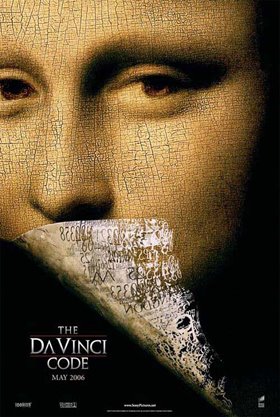 In anticipation of Angels & Demons, the prequel-cum-sequel to The Da Vinci Code, a few weeks back, I revisited Ron Howard's adaptation of the second Robert Langdon bestseller.
In anticipation of Angels & Demons, the prequel-cum-sequel to The Da Vinci Code, a few weeks back, I revisited Ron Howard's adaptation of the second Robert Langdon bestseller.
Unless you've spent the last three years living under a rock, which was, itself, situated under an even bigger rock, you'll be aware of the critical mauling Howard's film received upon its release; the picture was reportedly booed at by critics attending its premiere at the 2006 Cannes film festival.
At the time, I dismissed the claims as Tall Poppy Syndrome at work. With Dan Brown's books seemingly shifting more copies than there are human beings to read them, the time was right to cast aspersions on the man's work. Bizarrely, Tom Hanks' hairstyle even came under heavy fire. But was it deserving of the attacks? (The film, not Tom Hanks' hair.)
In this viewer's eyes, no. However, it must be said that the film version of The Da Vinci Code, in spite of (or perhaps because of) an unwavering devotion to its source material, is a rather different beast to The Da Vinci Code, the novel. Where Brown's page-turning yarn takes its readers along for the ride, allowing us to solve the book's numerous riddles alongside symbologist Robert Langdon and cryptographer Sophie Neveu as we swiftly precede through one brief chapter after another, Howard's adaptation is comparatively languid in pace.
It's a key difference, and one that it appears many critics were unable to overcome. Audiences, however, flocked to see The Da Vinci Code, prompting the film to rake in over $700 million worldwide. These are the same audiences who fervently snapped up copies of the novel before reading it on trains, planes and buses the world over before telling their friends to do the same. It's obvious that Howard and screenwriter Akiva Goldsman both belong to this readership and, subsequently, made their adaptation for this readership, as the film is steadfast in its faithfulness to Brown's controversial tome.
The result is a rich, thinking person's thriller that will be enjoyed by anyone who eagerly flipped through The Da Vinci Code's pages. For the most part, the characters are brilliantly brought to life with pitch-perfect casting. Indeed, with just one key exception, it's difficult to imagine anyone else portraying the numerous characters populating The Da Vinci Code: Audrey Tautou, Jean Reno, Paul Bettany, Jürgen Prochnow and Alfred Molina bring their respective parts to life with ease, while Sir Ian McKellan steals each and every scene he's in as Holy Grail enthusiast Leigh Teabing.
The one omission from this list is, oddly enough, leading man Tom Hanks. From the moment Robert Langdon is summoned from a book signing to assist in the murder of a curator at the Louvre who may or may not have been a high-ranking member of a secret religious society, Hanks is strangely wooden and disconnected. In one of the novels, Brown likens Langdon to Harrison Ford, whose dynamic persona is at ends with Hanks' apparent staidness. A thriller this talky needs a vibrant lead to carry it, and it's only during the movie's final sequence – a real standout of the film, accompanied as it is, by Hans Zimmer's dazzling soundtrack – that Hanks really comes into his own as Langdon.
Elsewhere, Howard stunningly realises the book's numerous flashback sequences, thanks to some magnificent cinematography by Salvatore Totino, who is also responsible for giving Paris the appealing golden allure it possesses in the film. Indeed, the whole movie has a look and feel that's all its own. The Da Vinci Code truly feels like a unique film; not your typical summer blockbuster.
Perhaps an injection of that blockbuster vigour is precisely what The Da Vinci Code needed. It's all played too straight at times. Ian McKellan offers up considerable energy to the proceedings, as do the sequences in which Langdon uses his eidetic memory to solve the puzzles on his quest to unearth the truth. It's the bits in between that lack in zest. Meanwhile the final revelation doesn't nearly carry the weight that it ought to. Despite its earnestness, The Da Vinci Code remains largely compelling viewing.
For viewers after a simpler, swifter and more explosive thriller, I suspect Angels & Demons will be up your alley. It appears to remedy The Da Vinci Code's flaws in that it's more of a straight, race-against-time type affair that's relatively light on exposition and heavy on action.
I watched The Da Vinci Code's extended edition on DVD, which adds another 25 minutes or so to the theatrical cut. While this may even further put off those detractors who found the film too dry and talky, fans of the novel will relish seeing it all up there on screen. Don't expect The Da Vinci Code to be a traditional blockbuster, overlook its absurdities (and if it's that disconcerting, Hanks' hair), and watch Dan Brown's novel come to life.
2 comments:
I enjoyed The Da Vinci Code at the theater. But I wish there would have been a romance along with the story to add more tension. That element was sorely missing - of course, I can understand why there wasn't a romance because of the story line, but still, the movie needed more anticipation.
Cheers! JJ
Actually, I appreciate that the lack of romance. It's become such a cliché in film and television when a man and a woman are put together in a scenario like this that love blossoms. I think it works better as a meeting of minds, rather than of hearts.
Thanks for the comment!
Post a Comment